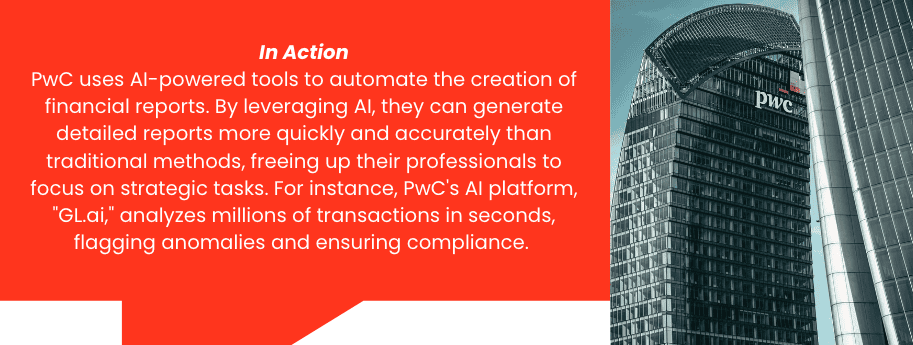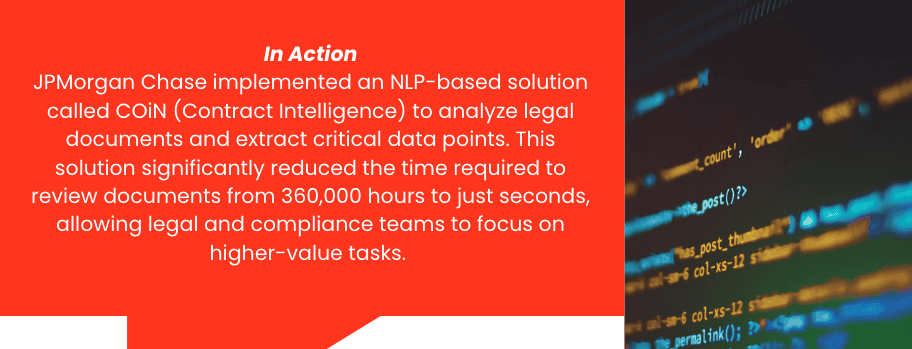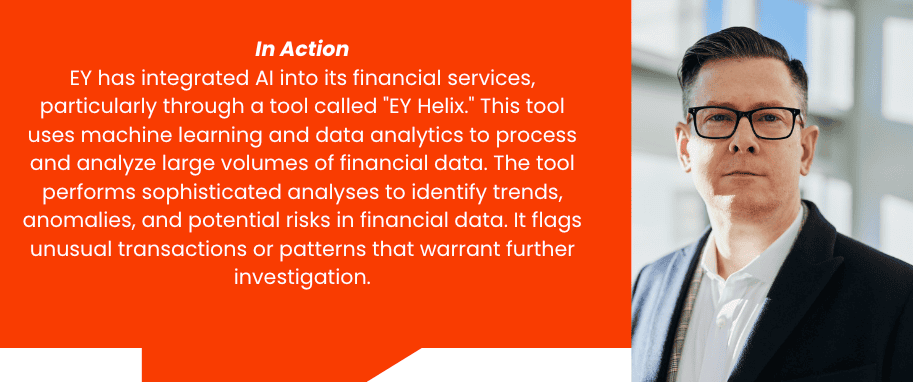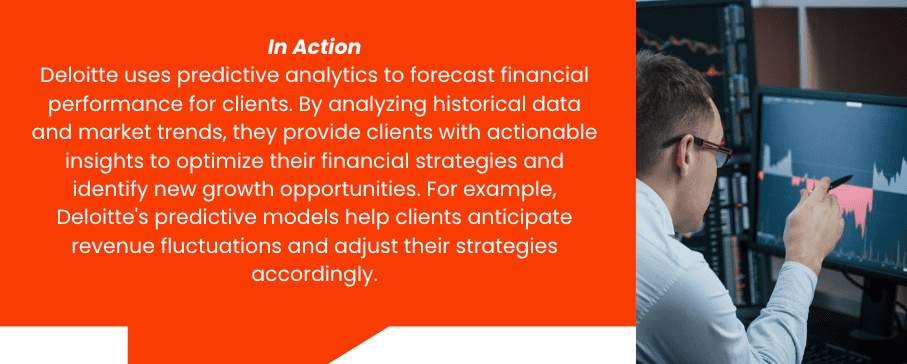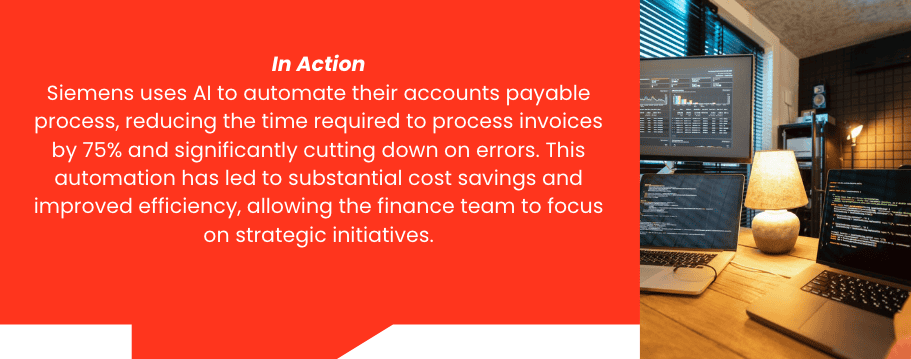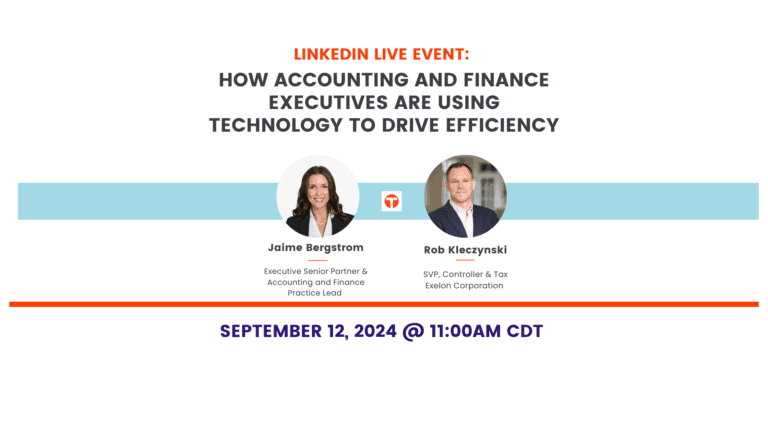Disruption is the new normal and finance executives are feeling the pressure. CEOs are giving a close look at the A&F function, demanding more with less. That means now is the time to eliminate outdated processes, lead the change, and embrace innovation and technology.
For accounting and finance professionals, that means turning to artificial intelligence (AI) to streamline processes, improve accuracy, and uncover new insights. With AI, companies can boost efficiency, cut costs, and make smarter, data-driven decisions that enhance their bottom line.
AI is already transforming the accounting and finance (A&F) industry. According to Deloitte, 73% of finance leaders believe AI will have a significant impact on their organizations by 2025. But what are the practical ways AI is driving this change? In this blog, we’ll explore the top 5 ways AI is improving efficiency in accounting and finance. From automating tedious tasks to enhancing financial forecasting, we’ll highlight how AI tools are reshaping the future of finance.
#1: Automated Report Generation
Overview:
AI-powered automated report generation tools can create customized financial reports, forecasts, and analyses by processing vast amounts of historical data. These tools use machine learning algorithms to identify relevant data points and generate comprehensive reports tailored to specific business needs.
Applications:
- Weekly, Monthly and Quarterly Reports: Automating the generation of regular financial reports.
- Forecasting: Creating predictive models based on historical data to forecast future financial performance.
- Regulatory Compliance: Ensuring that reports adhere to the latest regulatory requirements.
Benefits:
- Time Efficiency: Reduces the time spent on manual report preparation, allowing professionals to focus on strategic activities.
- Accuracy: Minimizes human errors, ensuring more reliable data and better decision-making.
- Consistency: Standardizes reporting formats across the organization, enhancing clarity and comparability.
#2: Natural Language Processing
Overview:
Natural Language Processing (NLP) enables AI systems to understand, interpret, and generate human language. In finance, NLP tools can analyze unstructured data sources, such as emails, contracts, and financial statements, to extract meaningful insights and automate routine tasks.
Applications:
- Data Extraction: Parsing financial documents to extract key information.
- Sentiment Analysis: Analyzing market sentiment from news articles and social media.
- Automated Responses: Generating human-like responses for customer service inquiries.
Benefits:
Efficiency: Automates the extraction of data from vast amounts of unstructured text, saving time and resources. Insight Generation: Provides deeper insights by analyzing qualitative data, supporting better decision-making. Improved Communication: Enhances interaction with AI systems through natural language queries.
#3: Risk Assessment and Fraud Detection
Overview:
AI algorithms can analyze patterns in financial data to identify anomalies, assess risks, and detect fraudulent activities. These systems use machine learning to continuously improve their detection capabilities, providing robust risk management solutions.
Applications:
- Anomaly Detection: Identifying unusual transactions that may indicate fraud.
- Credit Risk Assessment: Evaluating the creditworthiness of clients using predictive analytics.
- Regulatory Compliance: Ensuring adherence to financial regulations by detecting suspicious activities.
Benefits:
- Early Detection: Identifies risks and fraud at an early stage, minimizing potential losses.
- Compliance: Helps maintain regulatory compliance, avoiding costly penalties.
- Enhanced Security: Strengthens the overall security of financial transactions, protecting the firm’s assets.
- Profitability: Reduces financial losses from fraud and non-compliance, directly impacting the bottom line.
#4: Predictive Analytics
Overview:
Predictive analytics leverages AI models to analyze historical data and market trends to forecast future outcomes. This enables finance professionals to develop data-driven strategies, optimize resource allocation, and identify growth opportunities.
Applications:
- Financial Forecasting: Predicting future revenues, expenses, and cash flows.
- Market Analysis: Analyzing market trends to make informed investment decisions.
- Budgeting: Creating more accurate budgets based on predictive models.
Benefits:
- Accuracy: Provides more precise forecasts than traditional methods, leading to better financial planning.
- Proactive Planning: Allows for better preparation and strategic planning, reducing uncertainties.
- Resource Optimization: Helps in efficient allocation of resources, enhancing operational efficiency.
#5: Financial Process Automation
Overview:
Financial process automation involves using AI to streamline and optimize various financial processes such as accounts payable, accounts receivable, and payroll. By automating these routine tasks, CFOs can enhance operational efficiency and reduce costs.
Applications:
- Accounts Payable: Automating invoice processing and payment approvals.
- Accounts Receivable: Streamlining the invoicing and collections process.
- Payroll Management: Automating payroll calculations and disbursements.
Benefits:
- Efficiency: Streamlines routine financial processes, saving time and reducing manual effort.
- Cost Savings: Reduces operational costs by minimizing manual intervention and errors.
- Accuracy: Enhances the accuracy of financial processes, reducing the risk of errors and discrepancies.
- Profitability: Improves cash flow management and reduces costs, enhancing overall profitability.
In today’s rapidly changing business environment, embracing AI-driven solutions isn’t just a competitive edge—it’s a necessity for accounting and finance professionals. From streamlining financial reporting to detecting fraud and optimizing forecasts, AI offers a wealth of opportunities to improve efficiency, reduce costs, and drive better decision-making.
If you’re ready to learn more about how technology is revolutionizing the accounting and finance landscape, don’t miss our upcoming LinkedIn Live event, “How Accounting and Finance Professionals Use Technology to Drive Efficiency.“ Join industry experts as we explore the practical applications of AI, the latest tech innovations, and how they’re transforming the way we work.
Save the date and tune in for valuable insights that can help you stay ahead of the curve and lead with confidence in your organization. We look forward to seeing you there!


